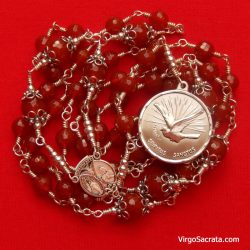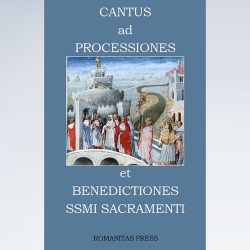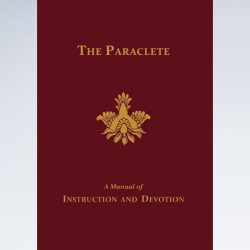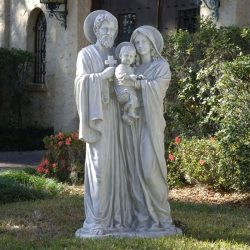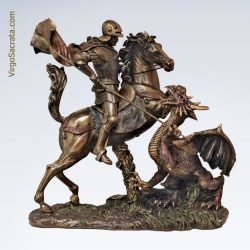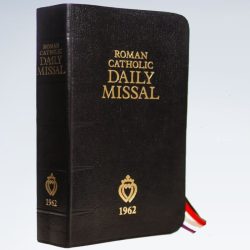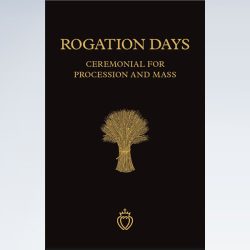
The Chaplet of Our Lord, also known as The Crown of Our Lord, The Rosary of Our Lord, or The Camaldolese Crown Rosary was instituted through divine inspiration about the year 1516, by the blessed Michael of Florence, a Camaldolese monk, who used to say it every day until his death, Jan. 11, 1522.
This rosary is called the Chaplet of our Lord, because it is said in honour of Jesus Christ, and is composed of thirty-three Pater noster’s, in remembrance and veneration of the thirty-three years which he lived on the earth; to these are added five times Ave Maria in honour of His five most holy wounds; the first three of which are said, one at the beginning of each of the three sets of ten Pater noster’s, and of the two remaining, one is said previous to reciting the three concluding Pater noster’s, and the other after them. The Chaplet finishes with the Credo in honour of the holy Apostles its composers, and which itself contains an epitome of the Birth, Life, Passion, and Death of our Divine Lord Jesus Christ.
Pope Leo X, at the prayer of the above-named blessed Michael, granted by a Bull, dated February 18, 1516, several Indulgences to anyone who should keep about him the said Chaplet, or say it. Gregory XIII did as much by means of a Brief dated Feb. 14, 1573; and Sixtus V by another Brief, dated Feb. 3, 1589.
These Indulgences were all confirmed anew by Clement X in a special Brief, De salute Dominici gregis, dated July 20, 1674, who also added several more Indulgences, as follows:
i. Indulgence of 200 years every time any one shall say it, being penitent and having confessed, or having at least firmly resolved to confess.
ii. Indulgence of 150 years to any one who, having Confessed and Communicated, shall carry about him one of these Chaplets, and say it every Monday, Wednesday, and Friday, and. also on au festivals of obligation.
iii. Plenary indulgence once a year on any one day, to any one who, after Confession and Communion, shall have made a practice of saying it at least four times a week.
iv. Plenary indulgence once a month to any one who shall have said it every day for a month, and shall then, bring penitent, after Confession and Communion, pray to God, for the Holy Church, &c.
v. Plenary indulgence to any one who shall die in battle against the infidels, having been previously accustomed to say the said Chaplet three times a week, and having said it on the day of his death, or the day previous to it, provided he be penitent for his sins, and ask pardon of God for them.
vi. Plenary indulgence, and remission of all sins in the article of death, to any one who, being penitent and having confessed, shall then invoke, at least with his heart if he cannot do so with his lips, the most holy Name of Jesus; provided he has said the above-named Chaplet once during his illness with the intention of gaining this Indulgence: in the event of his recovery, he may gain the 200 years indulgence.
vii. Indulgence of twenty days to any one who shall carry about him one of these Chaplets, and invoke the adorable Name of Jesus, after he has made an examination of conscience with contrition for his sins, and said three Pater noster’s and three Ave Maria’s for the good estate of the Church.
viii. The indulgence of twenty years to any one who, having examined his conscience and confessed, shall, after his confession, pray to God for the advancement of the Catholic Faith, the extirpation of heresy, and the exaltation of the Holy Church, &c.; and
ix. The indulgence of ten years to any one who, having about him the said Chaplet, shall say three Pater noster’s and three Ave Maria’s, as often as he does any spiritual or temporal good work in honour of our Lord Jesus Christ, the Blessed Virgin Mary, or some saint, or for the good of his neighbour.
x. Any one who keeps one of the said Chaplets about him, if he is wont to practise any exercise customary in any religious order, shall participate in all the good works which are done in the order in whose pious exercises in has made the intention of sharing; if he assist at Holy Mass, he shall, by saying five Pater noster’s and five Ave Maria’s, supply for every defect and distraction which has happened to him through inadvertence in the course of the Mass; moreover, if on days of obligation he has been legitimately hindered from hearing Mass, he shall have the same merit as if he had assisted at it, provided he say the five Pater noster’s and five Ave Maria’s as above.
xi. Any one out of Rome keeping one of these Chaplets about him, shall, on the days of the Stations, gain the 200 years indulgence on visiting any church he chooses; if hindered from doing so, he shall gain the same indulgence by saying this Chaplet, the seven Pestilential Psalms, with the Litanies and prayers. The same Indulgence in Rome may be gained by any one who, being legitimately hindered from visiting the Church of the Station, shall say the Chaplet and Psalms as above
Pope Benedict XIII. afterwards, by a decree of the S. Congr. of Indulgences, dated April 6, 1727, confirmed all the above Indulgences, and added another –
xii. Plenary indulgence to anyone who, after having Confessed and Communicated, should say this Chaplet on Friday. The plenary indulgence can only be gained on the Fridays in March, and that after the works enjoined above have been fulfilled; as was declared by Pope Leo XII., in a decree of the S. Congr. of Indulgences, dated Aug 11, 1824.
In order to gain the above-named Indulgences, it is necessary that:
1. The Chaplet be blessed by the Reverend Fathers of the Camoldolese order, either hermits or monks, or else by those who have apostolical authority to bless them. Once blessed, they cannot be sold, or lent to others for the purpose of communicating to them the indulgences: in which case they would afterwards be deprived of the Indulgences annexed to them according to the brief of Pope Clement X.
2. Every one saying the Chaplet must, according to his capacity, meditate on the mysteries of the life of our Lord Jesus Christ. It is not, however, necessary either to read or recite the following short reflections, which are only added for the greater devotion of anyone who might wish to make use of them.
How to Pray The Chaplet of Our Lord
Begin with an act of contrition.
First Decade.
The Archangel Gabriel makes known to the Blessed Virgin Mary the Incarnation of the Divine Word in her pure womb.
Ave Maria
1. The Son of God made man is born of Mary the Virgin in a stable.
Pater noster.
2. The Angels rejoice and sing, Gloria in excelsis Deo.
Pater noster.
3. The shepherds hear the Angels’ tidings, and come and adore Him.
Pater noster.
4. He is circumcised the eighth day, and called by the most Holy Name of Jesus.
Pater noster.
5. Is adored by the Magi with offerings of gold, frankincense, and myrrh.
Pater noster.
6. Is presented in the Temple, and foretold to be the Saviour of the world
Pater noster.
7. Flies from the persecution of Herod, and is carried into Egypt.
Pater noster.
8. Herod finds Him not, and murders the Innocents.
Pater noster.
9. He is carried back by Joseph and His Mother into Nazareth his home.
Pater noster.
10. Disputes in the Temple with the doctors, being twelve years old.
Pater noster.
Add the Eternal rest, &c. if said for the departed.
Second Decade.
Jesus is most obedient to the Blessed Virgin His Mother, and to St. Joseph.
Ave Maria.
1. When thirty years old, He is baptized by John in Jordan.
Pater noster.
2. Fasts forty days us the desert, and overcomes the tempter.
Pater noster.
3. Practises and preaches His own holy law, whereby is life eternal
Pater noster.
4. Calls His disciples, who forthwith leave all and follow Him.
Pater noster.
5. Works His first miracle of changing water into wine.
Pater noster.
6. Heals the sick, makes the lame to walk, gives hearing to the deaf, sight to the blind, life to the dead.
Pater noster.
7. Converts sinful men and sinful women, and pardons their sins.
Pater noster.
8. When the Jews persecute Him even unto death, He chastises them not, but sweetly chides them.
Pater noster.
9. Is transfigured on Mount Thabor, in the presence of Peter, James, and John.
Pater noster.
10. Enters triumphant into Jerusalem sitting on an ass’s colt, and drives the profaners from the Temple.
Pater noster.
Eternal rest, &c. as above.
Third Decade.
Jesus takes leave of His most holy Mother before He goes to die for our salvation.
Ave Maria
1. Celebrates the Last Paschal Supper, washes the Apostles’ feet.
Pater noster.
2. Institutes the most holy Sacrament of the Eucharist.
Pater noster.
3. Prays in the garden, sweats blood, and is comforted by an angel.
Pater noster.
4. Is betrayed by Judas with a kiss, is taken and bound by the officers of justice as a great malefactor.
Pater noster.
5. Is falsely accused, is buffeted and spit upon, and shamefully used before four tribunals.
Pater noster.
6. Looks tenderly on Peter after he had thrice denied Him, and converts Him; whilst Judas despairs, hangs himself, and is lost.
Pater noster.
7. Is cruelly scourged at the pillar, and receives innumerable blows.
Pater noster.
8. Is crowned with thorns, shown to the people, who cry, Crucify Him! crucify Him!
Pater noster.
9. Is condemned to die, carries the heavy cross with grievous pain upon His shoulders to Mount Calvary.
Pater noster.
10. Is crucified between two thieves, dies after three hours’ most painful agony, is wounded in the side with a lance, and is buried.
Pater noster.
Eternal rest, &c. as above.
Jesus rises the third day, and visits first of all His most holy Mother, Mary.
Ave Maria.
1. Appears to the three Marys, and bids them tell the disciples they have seen Him risen from the dead.
Pater noster.
2. Appears to the disciples, shows them His most holy Wounds, makes Thomas touch them.
Pater noster.
3. The fortieth day after his resurrection, blesses most holy Mary His Mother and all his disciples then ascends into heaven.
Pater noster.
Let us pray to the most holy Virgin to obtain for us also the blessing of her Divine Son Jesus Christ, now and at the hour of our death.
Ave Maria.
Eternal rest, &c. as above.
Let us say “I believe,” &c. in honour of the holy Apostles.
End with the prayer said to be St. Augustine’s.
| Oremus | Let us pray |
| Deus, qui pro redemptione mundi voluisti nasci, circumcidi, a Judaeis reprobari, a Juda traditore osculo tradi, vinculis alligari, sicut agnus innocens ad victimam duci, atque conspectibus Annae, Caiphae, Pilati, et Herodis indecenter offerri, a falsis testibus accusari, flagellis et opprobriis vexari, sputis conspui, spinis coronari, colaphis caedi, arundine percuti, facie velari, vestibus exui, cruci clavibus affigi, in cruce levari, inter latrones deputari, felle et aceto potari, et lancea vulnerari: tu Domine, per has sanctissimas poenas tuas, quas ego indignus recolo, et per sanctam crucem et mortem tuam libera me (et hunc famulum tuum .N. agonizantem) a poenis inferni, et perducere digneris, quo perduxisti latronem tecum crucifixum; qui cum Patre et Spiritu Sancto vivis et regnas Deus per omnia saecula saeculorum. Amen. | O Lord, who to redeem the world and to free us from the pains of hell, didst vouchsafe to be born amongst men, subject to pain and to death, to be circumcised, rejected, and persecuted by the Jews, betrayed by Thy disciple Judas with a sacrilegious kiss, and as a lamb, gentle and innocent, to he bound with cords, and dragged in scorn before the tribunals of Annas, Caiphas, Pilate, and Herod; who didst suffer Thyself to be accused by false witnesses, torn by scourges, crowned with thorns, smitten with blows, insulted with spittings, to have Thy divine countenance covered out of contempt, to be many ways set at naught and outraged, to be filled with reproaches and ignominies, and, last of all, to be stripped of Thy clothes, nailed to and raised high upon a cross between two notorious thieves, to be drenched with gall and vinegar, and then pierced with a lance, and so to fulfil the mighty work of our redemption: Saviour most tender, by these Thy many cruel sufferings borne by Thee out of Thy love for me, which I, unworthy as I am, yet dare to contemplate, by Thy holy cross, and by Thy bitter death, free me (and this Thy servant *) from the pains of hell and vouchsafe to bring me to Paradise, whither Thou didst lend the penitent thief who was crucified with Thee, my Jesus, who, with the Father and with the Holy Ghost, livest and reignest God for ever and ever. Amen. |
* If said for a soul in its agony.
Text from: “The Raccolta: or Collection of Indulgenced Prayers.”
With the Appendix of Indulgences granted by His Holiness Pius IX. from 1856 to 1866.
Translated by Ambrose St. John, of the Oratory of St. Philip Neri, Birmingham.
VIRGÓ SACRÁTA is a Christian mission-driven online resource and shop inspired from the beauty of Catholic faith, tradition, and arts. Our mission is to “Restore All Things to Christ!”, in continuing the legacy of Pope St. Pius X under the patronage of the Blessed Virgin Mary. “Who is she that cometh forth as the morning rising, fair as the moon, bright as the sun, terrible as an army set in battle array?” O Mary, conceived without sin, pray for us who have recourse to Thee.


